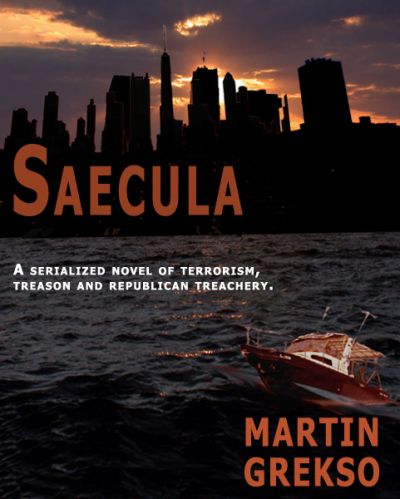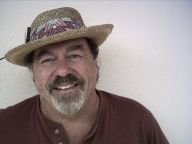
2008
Episode
13
Tom
Bishop
Previously in "Saecula:” An elite Republican
cabal conspires to steal the
2008 presidential election. Confronted with
devastating poll numbers
from the disasteroud Islamic War, it sets
in motion the ultimate October
Surprise, a terrorist attack on the nation.
Today: Tom Bishop's Private Army
It was only 6:30 in the morning, and already the
June humidity in Washington was stifling, hinting
what was in store when the real summer
arrived. Bishop cranked up the AC in his $100,000
Jaguar XK and thanked the lord he was now fighting
terrorism from a plush air conditioned office
in the nation’s capital and not some putrid tropical
river port. He had seen the writing on the wall.
Just because his countrymen were too dim-witted
to realize they were bogged down in a colonial
war against Islamic nationalists they were never
going to win didn’t mean he should forego profiting
from their stupidity. He did his 20 and out, and
used his skills and contacts to start up Poseidon
six years ago.
Bishop had chosen the name of the Greek god of
the sea and the company’s trident logo to reflect
his career as a Navy SEAL. But the more ominous
connection was the fact that Poseidon was the
brother of Zeus, the principal god in the Greek
pantheon, and the one ultimately responsible for
the conduct of war. The symbolism was reflected
in the company’s extensive relationships
throughout a Pentagon that had come to rely heavily
on contract firms for paramilitary activities
in support of U.S. operations in the war zone.
Just as mercenaries, or as they preferred to be
called, private security contractors, had assumed
greater responsibility for special operations
from the Pentagon, Poseidon agents had become the
primary in-country source of clandestine activities
for the government. In 1977, Stansfield Turner,
the newly appointed Director of Central Intelligence,
cleansed the agency of its less than reputable
elements following months of scandalous disclosures
of domestic spying and inappropriate collaboration
with right-wing Latin American dictators. In the
following decades, CIA policy wonks had insisted
that high technology was the future of sleuthing.
The ability to read license plates from space was
impressive during the Cold War but left gaping
holes in the new realities of boutique wars and
terrorism. The CIA’s superior intelligence gathering,
using satellite imagery, communications
intercepts and atmospheric tracking, was not doing
the trick.
While the CIA continued to whine about the difficulty
of developing “HUMINT,” or human
intelligence, Poseidon was years ahead of the
pitifully few CIA efforts to recruit spies. Its people
had became indispensable in the war effort --
and were paid very handsomely for their services.
Bishop’s lieutenants had originally developed
an extensive network of covert assets and sources
as part of its corporate security contracts. The
firm had no difficulty finding moonlighting nationals,
although paying them $1000 a day gave it, what
Tom Bishop like to smile and call, a slight edge.
And Poseidon had no qualms or political constraints
to ensure its assets were of “good character.”
Bishop knew if you wanted to find out what was
at the bottom of a cesspool, the people who knew
the answer already stunk.
So his handlers used the worst of the worse; men,
and even some women -- although their usefulness
in the male dominated Muslim world was marginal,
except as prostitutes -- who betrayed their fellow
Jihadists. His controllers knew enough to not
trust any of them, and to keep every asset self-contained
so as to not corrupt any of their other sources.
They were constantly alert for “dangles,” or double agents,
but even they could be useful if played properly.
For the most part, the feed provided was low-level
information and details of how al-Qaida cells
operated. On anything of significance, two and often three independent
verifications were required for Poseidon to treat the intelligence as more
than interesting filler.
Not that Poseidon had to eat the exorbitant wages.
Although the government was prevented by Congress
from budgeting top dollar to retain individual
specialists, they could hide millions of dollars in hundreds of contracts
to private firms. Add in the civilian contracts, that included both specialists
as well as truck
drivers, roustabouts, stevedores and other grunts,
and Poseidon actually had more “troops” in the
Middle East over the past five years than any
of America’s purported “coalition” partners. Bishop felt
more like a field general than a corporate executive,
except when his sales force kicked ass, people died.
Let the Pentagon supply the riflemen and tankers
and chopper crews; they were the cannon fodder of war; inexpensive cogs
the military could replace for a dime a dozen. His operators were the elites;
the best
trained; the most skilled; and the highest paid.
He was truly dismayed that some would have to pay
the ultimate price to secure the current assignment.
What absolute bureaucratic assholes, Bishop thought.
With what Poseidon procured in contracts from the government, the Pentagon
and CIA could have pulled off five times as many ops doing it themselves.
They had high quality personnel right up the chain
of command. He knew; he had stolen a lot of them
away, from sergeants to lieutenant colonels and
both combat veterans and spooks. Bishop employed
nearly 20 talent scouts, as well as paying healthy
finders fees to current operators, to identify and
recruit the best personnel after the American
taxpayers had paid millions of dollars to train them.
The more Bishop recruited, the fewer specialists
were available to the military, and the more the
government relied on the privates. It was a vicious
game of musical chairs, and only Bishop had a
permanent seat, often taking a good sized chunk
of the fees before farming out less important jobs
to the smaller fish. But this contract was to
remain completely in-house. In addition to the $20 million
contract fee, he had given his word to Bob Haney.
Next in "Saecila:" The "Brit" Puts the Plot Into Action.
by Martin
Gresko

Interested in publishing
this manuscript?
Or to make comments,
CONTACT Martin Gresko at VGABONSUN@hotmail.com
See his biweekly
political column http://www.StPetePost.com
